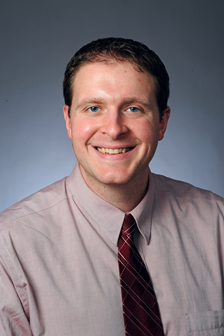

Ground is essential to sustainability issues: The literal soil on which all living things exist and also the global ground across which the sustainable message must spread. Andy Larson (’02) spends his time deeply immersed in all facets of this ground as a sustainable agriculture teacher. With a BS in Environmental Science and BA in Anthropology from Notre Dame and two masters’ degrees, Andy has an extensive background in both agricultural and environmental topics. Before reaching this point, Andy went through his fair share of introspection and exploration.
After his junior year at Notre Dame Andy spent his summer nights standing in streams examining algal herbivory at Notre Dame’s Environmental Research Center (UNDERC) in Michigan’s Upper Peninsula. It was there, as he analyzed algal density on bathroom tiles, that Andy developed his zeal for combining agriculture with environmental science.
This passion took Andy to the Extension service, where he now works as a Local Food Systems and Small Farms Extension Educator at the University of Illinois. Every land grant university has an outreach arm, created by the Smith-Lever Act of 1914. This outreach component, Extension, conveys the campus’ research to the community, through classes and workshops in agriculture, nutrition, community development and related fields. “I’m a live-long learner type of guy,” Andy says. It’s with Extension that he found the opportunity to create educational programs for adults, while continuing to learn himself.
Andy covers three to seven counties, teaching programs in Extension offices, community centers and even barns. He emphasizes that, “It can be anywhere as long as there’s a PowerPoint screen and people willing to listen.” Andy’s free-range chicken farm provides practical expertise that he’s glad to share with his students both inside and outside of classes. These students are full-time farmers or, more frequently, people with day jobs that embrace agriculture on the side. Exchanging knowledge and building a community of farmers are highlights of this sometimes challenging job.
There is often animosity between environmentalists and farmers. “There are usually misconceptions on both sides,” Andy says. He approaches controversial issues by seeing them as a chance to learn something. He goes in asking questions, rather than issuing judgment. It’s from there that he finds the essential middle line. Andy explains that society wouldn’t benefit from having only huge corn and soybean farms, but we also can’t survive off of only small fruit and vegetable farms. “I encourage the coexistence of a small-scale alternative market and large-scale conservation-oriented farming rather than screaming at each other from opposite ends of the spectrum.”
Finding common ground is an ongoing endeavor that enables Andy to pursue incremental and productive change. Farmers often associate environmentalists with a dirty word; people who advocate for restrictions and attack their way of life. However, Andy says, “There’s a lot of importance and impact that can come out of environmental schools of thought.” Likewise, it’s important for environmentalists to remember the perspective of those in the agriculture industry. “Farmers have always been stewards of the land and stewards of the animals because they have to be.”